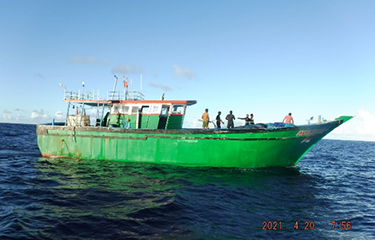IOTC publishes new list of vessels allegedly perpetrating IUU

The Indian Ocean Tuna Commission (IOTC) has released a new list of fishing vessels flagged to India and Sri Lanka that have allegedly carried out illegal, unregulated, and unreported (IUU) fishing within its area of jurisdiction.
IOTC Executive Secretary Christopher O’Brien said the vessels may have either fished in a manner inconsistent with IOTC Conservation and Management Measures in force, or failed to comply with laws and regulations of a coastal state in whose waters they were found fishing.
Some of the vessels may have also engaged in fishing activities exclusively for species that are not covered by the IOTC Agreement or IOTC Conservation and Management Measures.
For example, the Indian flagged AVE MARIYA is not on the current IOTC Record of Authorized Vessels, and “it is presumed it had no authorization from its flag state to fish on the high seas.”
“The longline vessel was fishing illegally without a licence within BIOT waters – it was inspected on 13 February 2022 and the Master admitted to have been fishing in BIOT for 7- 8 days with historical evidence of the vessel’s movements supports this,” IOTC said.
Another vessel, the Mangala, entered into a French exclusive economic zone and was found to have fish caught illegally inside French waters, the IOTC said.
However, the outbreak of COVID-19 hampered efforts by a team of investigators and representatives of British Indian Ocean Territory (BIOT) waters to the IOTC to board the vessel and carry out a full criminal investigation of the vessel’s activity.
Although India offered to probe the activities of the vessel, the India Fisheries Development Commissioner Anees Siddiqui said in a letter to IOTC “it is difficult to establish the identity of the fishing vessel AVE MARIYA without having its registration number of ownership details.”
He said unlike the offending vessel “all Indian fishing vessels are properly displaying their registration number along with the name of the flag.”
“The fishing vessel shows an Indian flag painted on the bow of the vessel, the lack of other registration or identifying mark suggests that the vessel is also in branch of Indian regulations,” Siddiqui says.
The IOTC said that vessels flagged to India illegally fishing in BIOT waters has become a recurring problem over several years, with little evidence India has taken action to prevent it.
In February 2022 IOTC estimated 18 vessels, that are believed to have been flagged to India, were operating in BIOT waters, “some potentially acting in an organized manner, reinforcing the view that flag state controls to prevent IUU by its nationals are lacking.”
In some instances, the vessels failed to record or report catches in accordance with IOTC management measures, or made false reports on catch.
Others have been called out for landing undersized fish in contravention of IOTC guidelines, with some found to be fishing during closed fishing periods or in closed areas. Other vessels were found to be using prohibited fishing gear, or engaged in transshipment with vessels no included in the IOTC Record of Authorized Vessels.
Photo courtesy of the Indian Ocean Tuna Commission






Share